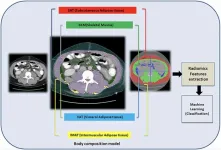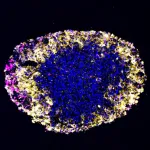SAN ANTONIO, Dec. 9, 2024 – Mays Cancer Center at The University of Texas Health Science Center at San Antonio (UT Health San Antonio), in partnership with the American Association for Cancer Research (AACR), is hosting the 47th annual San Antonio Breast Cancer Symposium at the Henry B. Gonzalez Convention Center on Dec. 10-13.
Owned and initiated by Mays Cancer Center, the San Antonio Breast Cancer Symposium is the world’s largest breast cancer research conference. More than 11,000 clinicians, researchers, and patient advocates from more than 102 countries are expected to convene in downtown San Antonio. A National Cancer Institute (NCI)- designated Cancer Center, the Mays Cancer Center launched the symposium in 1977 as a one-day regional conference. After more than four decades, the scientific and education symposium has grown to international prominence.
“Every year, we look forward to hosting the San Antonio Breast Cancer Symposium,” said Virginia Kaklamani, MD, leader of the Breast Cancer Program at the Mays Cancer Center and professor of medicine in the Division of Hematology and Oncology at UT Health San Antonio. “This symposium brings together experts from around the world to share knowledge, learn about new and emerging therapies, collaborate with peers and inspire the next generation of investigators dedicated to breast cancer research.”
Kaklamani is the symposium’s co-director, along with Carlos Arteaga, MD, director of the Harold C. Simmons Comprehensive Cancer Center at The University of Texas Southwestern Medical Center in Dallas.
This year, the Mays Cancer Center at UT Health San Antonio proudly celebrates 50 years of cancer care and research excellence in South Texas. Originally established in 1974 as the Cancer Therapy and Research Center, it began as a radiation therapy facility founded by a group of local radiation oncologists. Since then, Mays Cancer Center has achieved significant milestones, including groundbreaking discoveries in drug development, advancing care for Latino and underserved populations and hosting the inaugural San Antonio Breast Cancer Symposium in 1978, which welcomed just 140 attendees. In 1991, Mays Cancer Center became a National Cancer Institute-designated Cancer Center. It remains one of only four NCI-designated Cancer Centers in Texas and the only one serving San Antonio and South Texas.
Reuben Harris, PhD, professor and chairman of the Department of Biochemistry and Structural Biology at UT Health San Antonio, will lead a panel discussion as moderator of an educational session, titled “Tumor Heterogeneity and Evolution” on Tuesday, Dec. 10.
On Wednesday, Dec. 11, Marcela Mazo Canola, MD, breast oncologist at Mays Cancer Center and assistant professor in the Division of Hematology and Oncology at UT Health San Antonio, will present a discussion of impactful abstracts titled “Seen and Unseen Toxicities: Improving outcomes,” during the session, “The Heart of the Matter -- Improving Adverse Effects.”
Mazo’s presentation will include topics covering the incidence of osteonecrosis of the jaw (also known as ONJ) in patients with metastatic breast cancer who were treated with denosumab every 12 weeks; addressing financial difficulty over time in young adults with breast cancer; exploring the effects of cryotherapy as a way to prevent taxane-induced neuropathy in patients with early breast cancer; and understanding the feasibility of an interactive care plan to help breast cancer survivors manage symptoms and monitor their health after treatment.
Ismail Jatoi, MD, PhD, FACS, breast surgical oncologist at Mays Cancer Center and professor of surgery in the Division of Surgical Oncology and Endocrine Surgery at UT Health San Antonio, will moderate a panel discussion, titled “Risk Reduction and Early Detection: Updates on Breast Cancer Screening.”
A poster presentation, by principal investigator Jessica Treviño Jones, MD, breast medical oncologist at Mays Cancer Center and associate professor in the Division of Hematology and Oncology at UT Health San Antonio, titled “Comprehensive Approach to Prevention: We ‘CaRE’ Cancer Risk Reduction and Education Clinic,” will display the increasing breast cancer incidences and the shift towards higher rates of premenopausal breast cancer. The presentation focuses on why risk reduction strategies are effective for Hispanic women.
On Friday, Dec. 13, Andrew Brenner, MD, PhD, professor of medicine in the Division of Hematology and Oncology at UT Health San Antonio, presents an update from his Phase 1 dose escalation study of patients with leptomeningeal metastases, a condition where cancer cells from the breast, lung, kidney or melanoma spread to the brain and spinal cord. In his poster presentation, Brenner displays how single doses of 186RNL were well-tolerated by patients with no treatment-related side effects, showing promises for positive clinical outcomes and reductions in tumor cell counts.
To learn more about the San Antonio Breast Cancer Symposium, visit sabcs.org and view the symposium’s entire program.
###
The University of Texas Health Science Center at San Antonio (UT Health San Antonio) is one of the country’s leading health science universities and is designated as a Hispanic-Serving Institution by the U.S. Department of Education. With missions of teaching, research, patient care and community engagement, its schools of medicine, nursing, dentistry, health professions, graduate biomedical sciences and public health have graduated more than 43,886 alumni who are leading change, advancing their fields and renewing hope for patients and their families throughout South Texas and the world. To learn about the many ways “We make lives better®,” visit UTHealthSA.org.
Stay connected with The University of Texas Health Science Center at San Antonio on Facebook, Twitter, LinkedIn, Instagram and YouTube.
The Mays Cancer Center at UT Health San Antonio is one of only four National Cancer Institute-designated Cancer Centers in Texas. The Mays Cancer Center provides leading-edge cancer care, propels innovative cancer research and educates the next generation of leaders to end cancer in South Texas. To learn more, visit https://cancer.uthscsa.edu.
Stay connected with the Mays Cancer Center on Facebook, Twitter, LinkedIn, Instagram and YouTube.
END



